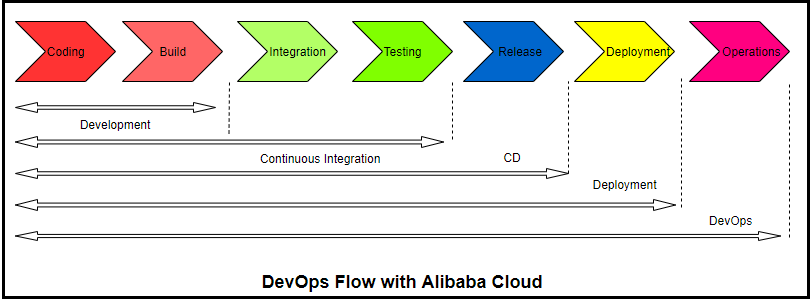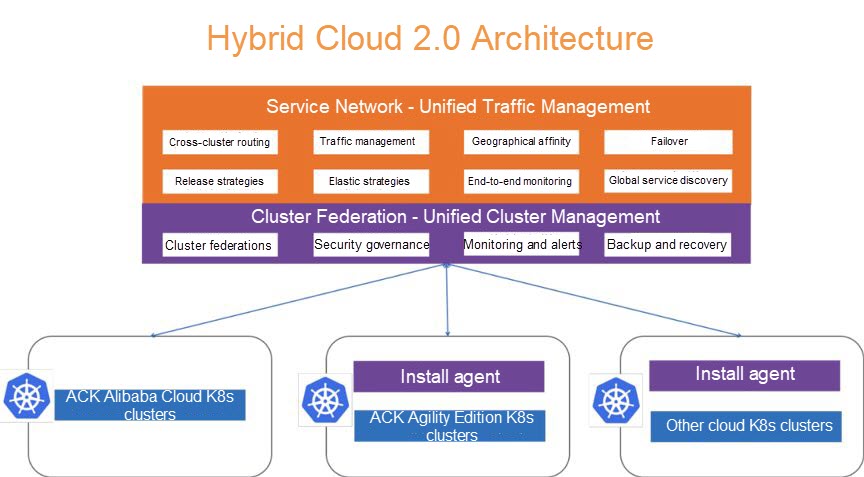By Shantanu Kaushik
DevOps started as a collaborative measure between the development and operation teams. It started as a practice but developed over time as a culture. The reason for its success is related to the evolution of the complete solution. The DevOps practice involved a better managed, scaled, and reliable solution that was developed with an advanced set of tools and industry-leading solutions.
The core of DevOps has been to automate the primary phases of the whole practice to make it efficient and to increase the overall performance. DevOps and the cloud have come across as a complementing partnership that improves the core competency of the overall practice and enhances software innovation. Alibaba Cloud has been the front runner in terms of the applied practices with more tools and services to make the overall solution more robust and reliable.
Enterprises have realized that continuous delivery of innovation driven development is the key to capitalize on the industry disruption and to improve upon the quality and cost of an application.
Let’s take a look at the Alibaba Cloud DevOps Model:

Alibaba Cloud presents a DevOps strategy by following a pattern that can be seen with its DevOps model.
Based on what I understand:
1. DevOps adoption has been expanding as organizations are moving to cloud-enabled application models based on the shared functionality from native apps.
2. DevOps can cover an end-to-end software delivery lifecycle (SDLC) and enable the usage of industry tools for collaboration and automation.
3. The Hybrid Cloud platform is an example of an advanced practice going mainstream.
4. DevOps practices can be vital to an organization. With Alibaba Cloud Hybrid Cloud platform, large organizations can pursue different goals and processes by involving multiple teams to collaborate on a unified objective-based project.
5. Continuous Integration and Continuous Delivery (CI CD) has to be given a significant role in DevOps practice through automation.
In an ever-changing world, the cloud is used as an umbrella term for a lot of solutions and practices that work with the same architectural values, such as data analytics, social technologies, Machine learning, and AI. Every service runs with a collaboration mechanism that is already using hybrid cloud practices for a more secure and enhanced service structure.
Good examples are the online applications that have captured the market of travel/transportation, entertainment, lodging, and communication. This disruption is driven by the changing world needs. Most businesses today are either on the verge of adopting digital transformation or have started moving already. These businesses are looking at models and facilities to make the shift easier and to use the market disruption to the fullest.
Implementation of a Hybrid Cloud with DevOps enables enterprises to leverage benefits, such as cloud-bursting, while maintaining a controlled structure and security over their applications and data.
One of the biggest challenges with the hybrid cloud and DevOps is the synchronization of the software development lifecycle across environments and teams.
The Hybrid DevOps model is supposed to take on the challenges that may prove to be the biggest clog in the chain of events leading to an industry-wide catastrophe. To overcome this, the Hybrid DevOps model has to sync with the Software as a Service (SaaS) and Platform as a Service (PaaS) solutions.
As the hybrid architecture suggests, maintaining control over data and applications while implementing DevOps practice to leverage the benefits of the hybrid cloud is the ultimate goal of a successful model. The key to achieving this is a perfect combination of automated planning, integration, and delivery.
Alibaba Cloud has made use of Kubernetes to enhance the delivery model by using containers. This is the reason that containerization is a prime mover within the digital transformation cycle. Using DevOps to build a cloud-native application requires an open infrastructure that follows the agile methodology. A pocket-friendly, secure, and flexible solution requires a practice that follows and adheres to the hybrid model of integration and delivery. Using containers to develop these cloud-native applications in the hybrid cloud environment takes care of a lot of challenges faced otherwise.
Let’s look at the Alibaba Cloud Hybrid Cloud 2.0 model:

To build these cloud-native applications using the hybrid cloud platform requires an end-to-end solution. The model depicted above solves these problems, helps share the workload, and manages it across the hybrid cloud solution.
Making the shift from on-premises to Hybrid Cloud takes a lot more than migrating to the cloud in general. It is a big change and can be considered a paradigm shift for an organization. These are the most fundamental things to consider:
The Hybrid Cloud solution solves the most inherent communication security issues between public and private clouds. The flexibility of operations is among the core of a hybrid cloud.
With emerging markets and more people-centric solutions, the Hybrid Cloud and DevOps solutions will be the models that most organizations adopt. This shall be used as a standard operating scenario, as this model provides a great deal of functionality with easy-to-use features and rich public cloud-based sharing models.
Customer interaction is now playing a critical role in how most organizations deliver solutions. Right from the development process to the delivery, continuous innovation is the prime mover for productivity and an SDLC that focuses on real-world solutions.
The Alibaba Cloud Hybrid Cloud model responds to an organization’s changing needs by allowing them to cut down on the release times and managing the Continuous Integration and Delivery with its DevOps model.
The views expressed herein are for reference only and don't necessarily represent the official views of Alibaba Cloud.
How Shopping Festivals Shape Retail: Insights from WPP's David Roth

2,593 posts | 793 followers
FollowAlibaba Clouder - October 29, 2020
Alibaba Clouder - February 9, 2021
Alibaba Clouder - December 31, 2020
Alibaba Clouder - October 20, 2020
Alibaba Clouder - October 27, 2020
Alibaba Clouder - April 16, 2021

2,593 posts | 793 followers
Follow Hybrid Cloud Storage
Hybrid Cloud Storage
A cost-effective, efficient and easy-to-manage hybrid cloud storage solution.
Learn More Hybrid Cloud Distributed Storage
Hybrid Cloud Distributed Storage
Provides scalable, distributed, and high-performance block storage and object storage services in a software-defined manner.
Learn More Apsara File Storage NAS
Apsara File Storage NAS
Simple, scalable, on-demand and reliable network attached storage for use with ECS instances, HPC and Container Service.
Learn More Alibaba Cloud Flow
Alibaba Cloud Flow
An enterprise-level continuous delivery tool.
Learn MoreMore Posts by Alibaba Clouder